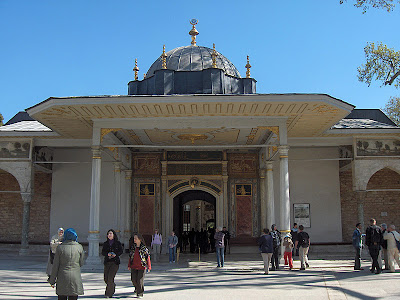The Topkapı Palace usually spelled "Topkapi" in English) is a palace in Istanbul, Turkey, which was the official and primary residence in the city of the Ottoman Sultans for approximately 400 years (1465-1856) of their 624-year reign.
The palace was a setting for state occasions and royal entertainments and is a major tourist attraction today, containing the most holy relics of the Muslim world such as the Prophet Muhammed's cloak and sword.Topkapı Palace is among those monuments belonging to the "Historic Areas of Istanbul", which became a UNESCO World Heritage Site in 1985, and is described in Criterion iv as "the best example[s] of ensembles of palaces [...] of the Ottoman period."
Byzantine remains in the Second Courtyard
Initial construction began in 1459, ordered by Sultan Mehmed II, the conqueror of Byzantine Constantinople. The palace is a complex made up of four main courtyards and many smaller buildings. At the height of its existence as a royal residence, the palace was home to as many as 4,000 people,[2] formerly covering a larger area with a long shoreline.
Basketmakers' Kiosk (foreground), Topkapı Palace in the back
The complex has been expanded over the centuries, with many renovations such as after the 1509 earthquake and 1665 fire. It held mosques, a hospital, bakeries, and a mint. The name directly translates as "Cannon gate Palace", from the palace being named after a nearby gate, which has since been destroyed.
The Imperial Gate (Bâb-ı Hümâyûn)
Topkapı Palace gradually lost its importance at the end of the 17th century, as the Sultans preferred to spend more time in their new palaces along the Bosporus. In 1856, Sultan Abdül Mecid I decided to move the court to the newly built Dolmabahçe Palace, the first European-style palace in the city. Some functions, such as the imperial treasury, the library, mosque and mint, were retained though.
The Imperial Mint (Darphane-i Âmire)
After the end of the Ottoman Empire in 1921, Topkapı Palace was transformed by government decree on April 3, 1924 into a museum of the imperial era. The Topkapı Palace Museum is under the administration of the Ministry of Culture and Tourism. The palace complex has hundreds of rooms and chambers, but only the most important are accessible to the public today.
The Gate of Salutation (Bâb-üs Selâm), entrance to the Second courtyard of Topkapı Palace
The complex is guarded by officials of the ministry as well as armed guards of the Turkish military. The palace is full of examples of Ottoman architecture and also contains large collections of porcelain, robes, weapons, shields, armor, Ottoman miniatures, Islamic calligraphic manuscripts and murals, as well as a display of Ottoman treasure and jewelry.
Some of the imperial carriages
The palace kitchens with the tall chimneys
The Tower of Justice next to the Imperial Council hall
Enderûn Library, or Library of Sultan Ahmed III
İznik tiles decorate the interior
Imperial Hall with the throne of the sultan
Upper terrace with fountain, İftar bower and Baghdad Kiosk
Terrace Mosque
One of the hollow trees, in the Third Court
 02:31
02:31
 homesweethome
homesweethome












































 Posted in:
Posted in: 








0 意見:
Post a Comment